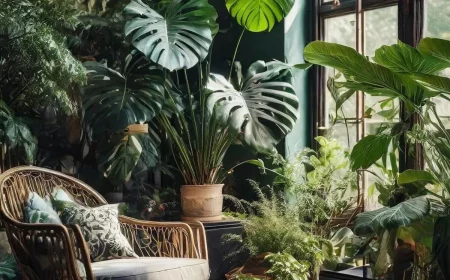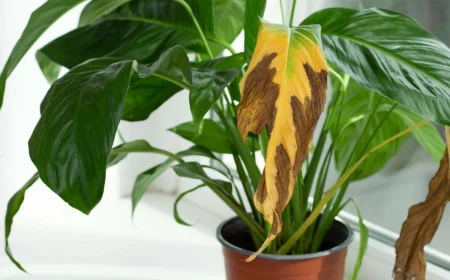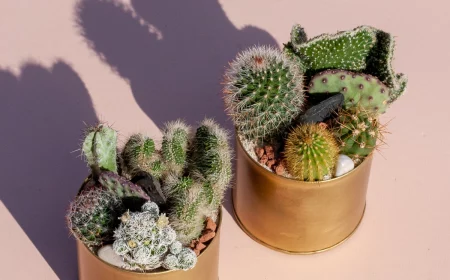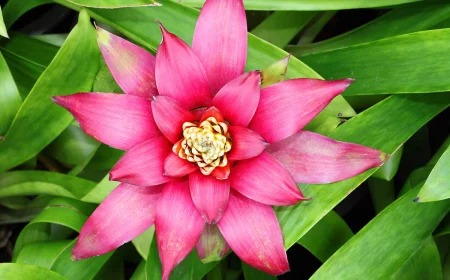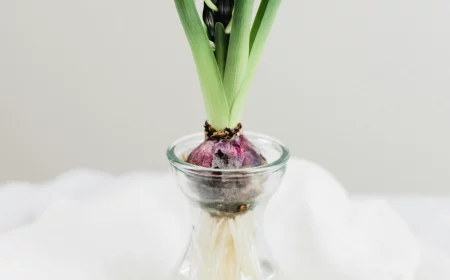The Real Deal on Succulents: Your Guide to Happy, Thriving Plants
I’ve spent a long time with my hands in the dirt, and if there’s one thing I’ve seen over and over, it’s people coming in with a sad, dying succulent asking, “What did I do wrong?” The biggest myth out there is that these plants are “no-maintenance.” Let’s be real—nothing alive is no-maintenance. They are incredibly low-maintenance, but only if you give them what they actually need.
In this article
- New to Succulents? Start Right Here.
- The Genius of a Succulent: Why They’re So Different
- Mastering Light: It’s More Than Just a Sunny Window
- Watering the Right Way: The ‘Soak and Dry’ Method
- The Foundation: Your Pot and Soil Mix
- Advanced Care and Troubleshooting
- A Few Final Words of Wisdom
- Inspirational Gallery
Think of a succulent as a wild thing that’s brilliantly designed for a life of intense sun and rare, heavy rain. Our job isn’t to baby it; it’s to mimic that environment. Once you get that, caring for them becomes second nature. This guide is all about getting past the generic advice and into what really works.
New to Succulents? Start Right Here.
Feeling overwhelmed by all the choices at the nursery? Don’t be. To get your confidence up, start with one of these nearly unkillable varieties. They’re forgiving and beautiful, a perfect combo.

- Snake Plant (Sansevieria): The champion of low light and neglect. It’s sleek, modern, and one of the toughest houseplants you can find.
- Zebra Haworthia: This one looks cool with its pointy, striped leaves, but it’s much happier with less light than most other succulents, making it great for apartments.
- Jade Plant (Crassula ovata): A classic for a reason. It’s sturdy, grows into a cool little tree shape, and practically tells you when it’s thirsty.
You can usually find these starter plants for around $5 to $15 at places like Home Depot, Lowe’s, or your local garden center.
Heads up! Your ‘Just Got Home’ Game Plan:
Okay, you bought a new plant. Now what? Don’t just stick it on a shelf and forget it. The first 24 hours are key.
First, keep it separate from any other plants you own. Seriously. Quarantine it for a few weeks to make sure it didn’t bring home any tiny pests like mealybugs. Next, resist the urge to repot it immediately. Let it acclimate to your home’s light and temperature for a week or two. That plastic nursery pot is fine for a little while. Your main job on day one is to find it a good spot and then leave it alone.

The Genius of a Succulent: Why They’re So Different
To really get succulent care, you have to appreciate how they’re built. They are little masters of survival.
Most plants breathe during the day, but that means they lose a ton of water through their leaves. Succulents have a clever trick up their sleeves (or, well, in their leaves). It’s a process called CAM photosynthesis. They wait until the cool of night to open their pores and take in carbon dioxide, storing it for later. When the sun comes up, they close up shop to save water and use the sun’s energy to photosynthesize. This is why a little air circulation, even from a small fan, is great for them—it helps them breathe better at night.
And of course, there’s the water storage. Those plump, fleshy leaves are basically tiny water tanks. When they’re full, the leaves are firm and fat. When they’re thirsty, they start using those reserves, and the leaves might look a little deflated or even wrinkled. Learning to see this is the single best skill you can have—it’s your plant telling you exactly when it needs a drink.

Mastering Light: It’s More Than Just a Sunny Window
“Bright, indirect light” is probably the most useless phrase in plant care. Let’s get specific. Most succulents crave at least six hours of bright light a day. In the Northern Hemisphere, a south-facing window is prime real estate. An east-facing window gives you gentle morning sun, while a west-facing one can sometimes be too harsh in the afternoon. (And for my friends in the Southern Hemisphere, just flip that—a north-facing window is your best bet!)
Your plant will tell you if the light is wrong. Not enough light causes etiolation—the plant will get tall and stretched out, with big gaps between the leaves as it reaches for the sun. The vibrant colors will also fade. Sadly, you can’t un-stretch a plant. The only fix is to “behead” it: cut the healthy, compact top off, let the cut end dry out for a few days, and replant it. The old stem will often sprout new babies, too!

Too much sun, on the other hand, can cause literal sunburn, which looks like a white or brown scar that won’t ever heal. A little bit of stress color, like red or purple tips, is often a good sign, but a fully scorched leaf is a damaged one.
A quick note on grow lights: If you don’t have sunny windows, grow lights are a total game-changer. Don’t waste your money on those cheap, single-bulb purple lights. You want a full-spectrum LED light, often sold as a bar or panel. Look for a color temperature between 5000K and 6500K, which is close to natural daylight. A decent setup will run you between $30 and $70 on Amazon or at a hydroponics store. You’ll need to hang it about 6 to 12 inches above your plants and run it on a timer for 12-14 hours a day.
Watering the Right Way: The ‘Soak and Dry’ Method
Overwatering is, without a doubt, the number one way people kill succulents. It’s not about how much water you give, but how often. They are built for a cycle of drought followed by a flood.

So, how do you know when it’s time? Don’t trust the surface of the soil—it dries out first. You need to know what’s happening at the roots.
Try This Now: Go pick up your succulent in its pot. Does it feel surprisingly light? Now grab a dry wooden skewer (like for kebabs) and stick it all the way to the bottom of the pot. Pull it out. If it comes out bone dry and clean, it’s probably time to water. If it’s dark, damp, or has soil stuck to it, wait.
When you do water, do it thoroughly. Take the plant to the sink and drench the soil until water pours out of the drainage hole. This ensures all the roots get a drink and helps flush out mineral buildup. Then—and this is critical—let it drain completely. Never let it sit in a saucer of water.
The difference between an under-watered plant and an over-watered one can be subtle at first. An under-watered leaf will look a bit wrinkly and feel soft but still leathery. An over-watered leaf will look yellowish or translucent, feel mushy, and often fall off at the slightest touch.

The Foundation: Your Pot and Soil Mix
The pot and soil aren’t just decorative; they’re your moisture management system. Get this right, and you’ve won half the battle.
Bagged “Cactus & Succulent Mix” is an okay start, but honestly, most of them still hold too much water. For just a few bucks more, you can make a far superior mix yourself. The goal is grit and drainage.
My Go-To Soil Recipe: Just mix equal parts of these three things:
- Potting Soil or Coco Coir: This is your organic base for a few nutrients.
- Perlite: Those little white puffy rocks. They create air pockets and help with drainage.
- Pumice or Chicken Grit: This is the secret weapon! It provides aeration and structure and keeps the soil from compacting. You can find pumice online or at specialty nurseries for about $15-$20 a bag, and insoluble chicken grit (crushed granite) is at farm supply stores.
When it comes to pots, the material makes a huge difference in how fast the soil dries. Unglazed terracotta is a beginner’s best friend. It’s porous, so it breathes and wicks moisture out through the sides, giving you a great buffer against overwatering. Glazed ceramic or plastic pots don’t breathe at all, so the soil stays wet much longer. They look great, but they are far less forgiving.

And the one rule that has absolutely no exceptions: the pot must have a drainage hole. If it doesn’t, it’s a decorative bowl, not a planter. A plant sitting in a pool of water is a dead plant waiting to happen.
By the way… see that powdery white film on some succulents, like echeverias? That’s called farina. It’s the plant’s natural sunscreen and waterproofing. A lot of beginners wipe it off thinking it’s dust, but it’s best to handle the plant by its lower leaves or stem to preserve that protective coating. Once it’s gone, it doesn’t come back.
Advanced Care and Troubleshooting
Once you’re comfortable, you can dial things in even more.
Fertilizing: Less is More Succulents don’t need much food. Fertilize maybe two or three times a year, only during their growing season (usually spring and summer). Use a balanced liquid fertilizer made for cacti, dilute it to half-strength, and always apply it to damp soil, never dry.

Common Pests Check your plants regularly for pests. The most common are mealybugs (they look like tiny white cotton fluff). Just dip a Q-tip in 70% isopropyl alcohol and touch it to the bugs to dissolve them on contact. For bigger issues, an insecticidal soap spray works well.
Propagation: Free Plants! One of the most fun things about succulents is how easily you can make more. For many types, you can just gently twist off a healthy leaf, let it dry on a counter for a few days until the end calluses over, and then lay it on top of some dry soil. Don’t water it! In a few weeks, it will sprout tiny roots and a brand new baby plant.
A Few Final Words of Wisdom
Be aware that some succulents, like the popular pencil cactus types, have a milky white sap that can be a skin irritant. It’s always a good idea to wear gloves when pruning them, just in case.

And finally, don’t be afraid to fail. Even the most experienced growers have killed plants; it’s how you learn. Root rot is a swift and serious problem, and if the base of your plant’s stem is black and mushy, it’s often too late. See it as a learning experience, grab a new, nearly-unkillable snake plant, and try again. You’ve got this.
Inspirational Gallery


That beautiful ceramic pot without a drainage hole might look stylish, but for a succulent, it’s a death trap. These plants are adapted to arid conditions and absolutely cannot tolerate sitting in water, which quickly leads to root rot.
The non-negotiable rule: Always choose a container with at least one drainage hole. Terracotta pots are a fantastic choice because the porous clay breathes, helping the soil dry out more evenly between waterings. If you fall in love with a decorative pot that lacks a hole, use it as a cachepot—simply place the succulent in its plain nursery pot inside the decorative one, and remove it for watering.

That dusty, silvery coating on your Echeveria isn’t dirt—it’s a natural, waxy sunscreen called ‘farina’.
This epicuticular wax is the plant’s defense mechanism against harsh UV rays and water loss. It’s incredibly delicate and rubbing it off can leave permanent fingerprints on the leaves. When handling your powdery succulents, try to hold them by the pot or the lower, older leaves to preserve this beautiful and functional protective layer.

Is your succulent suddenly getting tall, pale, and stretched out, with large gaps between the leaves?
This isn’t a sign of healthy growth; it’s a distress signal called etiolation. It means your plant is desperately searching for more light. While you can’t shrink the stretched parts, you can fix the problem for new growth. Immediately move it to the sunniest spot you have, typically a south-facing window. If your home lacks intense natural light, consider a simple full-spectrum LED grow light, like those from Sansi or GE, to give it the energy it craves.

- Create brand-new plants for free.
- Expand your collection or share with friends.
- Save a plant if its stem has started to rot.
The secret? Propagating from a single leaf. Gently twist a healthy, plump leaf from the stem of your succulent (Echeverias and Sedums work wonders). Let the leaf sit in a dry, shaded spot for 2-3 days until the tiny wound callouses over. Then, simply lay it on top of a tray of dry cactus soil. Don’t water it! In a few weeks, tiny roots and a miniature new plant will begin to sprout from the base of the leaf.

Forget using standard potting soil directly from the bag. It’s designed to hold moisture, which is the opposite of what your desert-loving succulent wants. The perfect soil is all about drainage and aeration.
- One part Cactus & Succulent Soil: Start with a good base, like the mixes from Espoma or Miracle-Gro.
- One part Perlite or Pumice: This is crucial. These lightweight volcanic rocks create air pockets and prevent compaction.
- One part Coarse Sand: Avoid fine play sand. Horticultural sand improves drainage significantly.
Mix these three ingredients thoroughly, and you have a gritty, fast-draining medium that mimics their native habitat and sets them up for success.
Don’t be alarmed if your vibrant succulent seems to stop growing and looks a little dull during certain times of the year. Many succulents, particularly popular varieties like Echeveria and Aeoniums, go through a dormancy period. For summer-dormant types, this happens during the hottest months, while others rest in the winter. During this time, their need for water drops dramatically. Watering a dormant plant as if it were actively growing is one of the fastest ways to cause rot. Observe your plant and let it rest.

